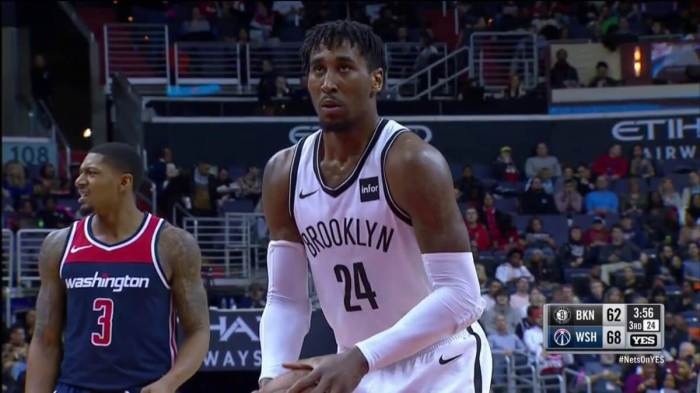
Team: Washington Wizards
Last Year’s Record: 19-63 (5th, Southeast Division)
Head Coach: Flip Saunders
Comings: Mike Miller, Randy Foye and Fabricio Oberto.
Goings: Darius Songaila, Oleksiy Pecherov and Etan Thomas.
Blogger Thoughts – Kyle Weidie, Truth About It:
“The Wizards could come together and compete with Cleveland, Orlando and Boston in the East for home court advantage in the playoffs. Of course, this tough mountain to climb will be contingent on a myriad of factors. Gilbert Arenas will have to find balance in his game as both a facilitator and a scorer to make thing easier for his teammates. The supporting cast of Caron Butler, Antawn Jamison and Brendan Haywood will have to stay healthy … especially Haywood, since without him, the defense is pretty bad. The Wizards have a deep team, but that doesn’t mean much unless young guys like Andray Blatche and Nick Young step up their effort and focus. The most important aspect is that there’s cohesiveness in the locker room and every player has been open and receptive to Flip Saunders.”
On the Nets:
“The Nets, I’m not so high on. I think they’ll be hands down the worst team in the East and will probably battle with the Kings and Timberwolves in the lottery ball contest. But hey, John Wall and Devin Harris could make a helluva combo for years to come. The good news is that there will be plenty of opportunity for the young guys to develop … as long as Rafer Alson doesn’t start spreading any cancer in the locker room.”
Comparing the Starters:
Starting PG – Gilbert Arenas (13.0 ppg, 10.0 apg, 18.92 PER) vs. Devin Harris (21.3 ppg, 6.9 apg, 21.65 PER): First, the obvious question: is Gilbert Arenas healthy? After only appearing in two games last season and 13 the year before because of knee injuries, it’s logical to be doubtful. Now, a middle-finger injury has been described by coach Flip Saunders as a potential “middle-finger” situation for Arenas. Arenas’ True Shooting percentage, which accounts for three-pointers and free throws has steadily declined since his standout 05-06 season (58.1, 56.5, 52.9, 43.3), when he averaged 29.3 points per game and was fifth in the league in offensive win shares with 11.2. Once considered “quick with the ball” it will be interesting to see what kind of quickness he has left after three knee surgeries. There are also questions if he’s a competent enough ball-handler and passer to effectively run the point for Washington. Defensively, you never know what you’re going to get from Agent Zero.
Advantage: Nets – Devin Harris is not exactly the most durable player either, but he’s been considerably more healthy than Arenas in recent years. Harris has also had a higher True Shooting percentage than Arenas every year since 2006-07. If Arenas regains his form from four seasons again, than this is an entirely different conversation, but is that likely?
Starting SG – Mike Miller (9.9 ppg, 4.5 apg, 13.84 PER) vs. Courtney Lee (8.4 ppg, 1.2 apg, 10.78 PER): Miller has long been one of the NBA’s better outside shooters, but in his only season in Minnesota last year, he saw his scoring average plummet from 16.4 to 9.9. A trade to Washington where he’ll fit in with some of the team’s other outside shooters could be a lift for his offensive game though ESPN’s John Hollinger is projecting a decrease in his True Shooting percentage this year from 58.8 to 54.3, and his Player Efficiency Rating, which evaluates a player’s overall game, from 13.84 to 12.42. Miller may also evolve into a ball-handling/passing shooting guard. He experienced a career high in assists (4.5) and assist ratio – the percentage of a player’s possessions that ends in an assist – which was 30.1 last season.
Advantage: Even. Courtney Lee is going to have an increased role on the offensive side this year compared to what he did in his rookie season in Orlando. That will lead to an increase in some of his numbers, though, as Hollinger predicts, his shooting percentages will likely go down. Lee is a better defender than Miller, but still has a lot to prove to be declared better in an overall sense.
Starting SF – Caron Butler (20.8 ppg, 6.2 rpg, 18.84 PER) vs. Jarvis Hayes (8.7 ppg, 3.6 rpg, 10.85 PER): Butler saw his scoring average go up a tick last season from 20.3 to 20.8, but all of his other numbers went down from 2007-08 including field goal percentage, three point shooting, free three shooting, True Shooting, assist ratio, rebounding rate (the percentage of missed shots a player rebounds), and Player Efficiency Rating. During his projections earlier this month, Hollinger is expecting another year of declines for Butler, but also expects the arrival of Mike Miller could enhance Butler shooting opportunities on the perimeter. Defensively, Butler wasn’t anything to get excited about last season. Still, Butler is a scorer, and a rather good one in the league, even if his peripherals suggest that he’s in decline.
Advantage: Wizards. Even in decline, Butler is going to give the Wizards considerably more night in and night out than what Jarvis Hayes can give the Nets. Hayes is a nice complimentary player, but not a scorer like Butler. Even though Hayes was a pretty good three-point shooter last year, his True Shooting percentage was lower than Butler’s because he’s not good enough from the foul line.
Starting PF – Antawn Jamison (22.2 ppg, 8.9 rpg, 20.63 PER) vs. Yi Jianlian (8.6 ppg, 5.3 rpg, 10.98 PER): Jamison is one of the best power forwards in the Eastern Conference and by most accounts, should have been an all-star last year, and could be an all-star again this year. Unlike some other members of the Wizards, Jamison’s offensive numbers have increased year-over-year, despite turning 33, where most players starting going into decline. Despite the injury bug that hit Washington last year, Jamison was very durable, playing 81 games. His Player Efficiency Rating of 20.63 was good for 4th among Power Forwards last year. He’s got a good jump shot for a big man and very rarely puts the ball on the ground with about 70 percent of his shots coming off assists. Defensively, he’s not considered the best help defender.
Advantage: Wizards. By a country mile. Jamison is an all-star, and Yi, while full of potential, put together an awful season among power forwards last year.
Starting C – Brendan Haywood (9.7 ppg, 7.3 rpg, 14.97 PER) vs. Brook Lopez (13.0 ppg, 8.1 rpg, 17.94 PER): Haywood was one of the better centers in the Eastern Conference in 2007-08, but injuries limited him to six games last season. He’s considered one of the better defender around the rim and he compliments the offensively-minded Wizards. He’s a good shot blocker, averaging 1.4 blocks per game for his career. He’s also a very effective inside scorer when healthy, sporting a .671 effective field goal average on inside shots in 07-08.
Advantage: Nets. Haywood is a good shot blocker and defender, but Lopez already seems to be a better one and he’s younger. Lopez also has a better jump shot than Haywood and is a better rebounder.
Bench: The Wizards have plenty of backcourt depth with Randy Foye, who will probably get some starts if Arenas is injured again or Miller is ineffective, scorers like Nick Young, and nice third-string depth with DeShawn Stevenson and Mike James. Dominic McGuire is a nice rebound/defense guy backing up Butler. Andray Blatch is projected by John Hollinger to have a PER above 15 (above league average) backing up Jamison and Haywood. JaVale McGee is talented but raw. He averaged 17.1 points, 10.3 rebounds and 2.6 blocks per 40 minutes last year. He is foul-prone however.
Advantage: Wizards. The Nets have a number of athletic wing-type that match up well with the Wizards’ backcourt, but they don’t appear to have the talent even in their starting frontcourt to match up with the bigs coming off Washington’s bench.

















